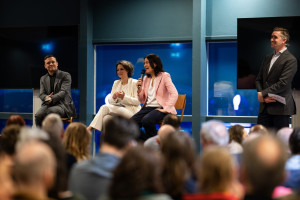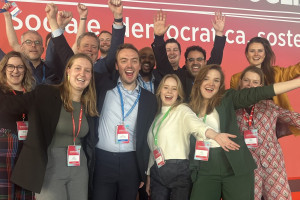Speech Lodewijk Asscher op Global Progress 2016: Why a Big Mac will not satisfy progressive hunger
Minister van Sociale Zaken en Werkgelegenheid en vice-premier Lodewijk Asscher was vorige week in Montreal, voor de conferentie Global Progress 2016. Global Progress verbindt progressieve denktanks, initiatieven, instellingen en organisaties uit de hele wereld. Het Global Progress netwerk deelt ideeën, middelen en talent in het streven naar een meer sociaal en economisch progressieve internationale gemeenschap.
14/15 September 2016 (Gesproken woord geldt)
When faced with fierce criticism about migration, globalization, and robotization we Progressives too often show a classic reflex:
Let’s just blame the ‘Deplorables’. Let’s point out how racist Trump is (and he is) or what a mistake Brexit was (and it was).
But in a way it is like eating a Big Mac. First, you feel instant gratification, but then disappointment will follow soon after.
In all honesty, we are not living up to our ideals when we disregard the enormous resistance people are demonstrating. Resistance to some of the trends we have for too long described as inevitable.
By pointing fingers and sometimes even humiliating voters, we have damaged our own language.
And as a result, the warm and fuzzy feeling we expect to encounter when we talk about solidarity, tolerance or progress through trade, is no longer working. People question the meaning of solidarity, tolerance or progress through trade. They wonder:
What is tolerance bringing us, at a time when the intolerant seem to be winning?
How can we still believe in solidarity when the gap between rich and poor is larger than life?
And how can we trust in trade when the winners of globalization are enjoying a free lunch, while the losers are footing the bill?
Don’t misunderstand me: The words are not the problem. They are great words. They are our words:
Solidarity. Tolerance. Progress.
We need to look elsewhere to understand why our answer is failing on us. We need to look at the disruptive forces that have changed our world for good.
Global integration. Global migration. The enormous speed of technological progress. These disruptive forces bring enormous challenges. Combined with climate change and globalized terror, the world now seems to be a threat itself.
It comes as no surprise that these forces lead to inner chaos. They lead to feelings of utter uncertainty and a complete lack of control.
Like being on a train that continues to accelerate while the driver has gone missing. For many people, the only way out seems to be the emergency brake.
A Brexit.
A wall.
A vote for Trump.
They apply the emergency brake, because they see it as the only option. Because the mantra of solidarity, tolerance and progress is no longer working.
People apply the emergency brake, because they see it as the only option.
These times are not only politically challenging, but also mentally taxing. There are a growing number of people who feel left out. Who perceive newcomers as a cultural and economic threat, and who wonder why the government is giving these newcomers money, houses and jobs, while they are getting nothing.
Unfortunately, these people have every reason to feel that way.
They are the ones who suffered the most from the economic crisis.
They are the ones who benefit the least from what our countries have to offer.
And they are the ones who could fall under our social security net, if we are not careful.
So instead of ridiculing them, the question we need to ask ourselves is: How do we deal with these valid concerns?
We all know that the emergency brake is not the answer. It will leave us stranded in the middle of nowhere. Empty-handed.
I am positive that global integration, migration and technological process can lead us to a new, more prosperous era. But not if we gallop recklessly ahead. In my opinion, Progressives must take control. Instead of putting a halt to the disruptive forces, we need to bend them in our favour. Otherwise we will see more inequality and more people looking for emergency brakes rather than for hard-fought political solutions.
We need to bend the disruptive forces in our favour.
We need to counter globalization and technology. Not by running back. Not by standing still. We can’t afford a standstill. We have to push ourselves forward and take the lead. With a clear goal.
Hence we need to globalize and innovate. But on our own conditions.
A future on our terms
First, we need to make a political choice regarding redistribution and fair taxation. For the Netherlands, for instance, this means that we need to make the employment of low-skilled workers cheaper, prevent tax evasion by multinationals, and re-inject the profits of these big companies back into society. These are imperative conditions. On our terms! As a result of the political choices we’ve made over the past few years in the Netherlands, income inequality has not increased any further.
Second, we must make sure that we don’t leave anyone behind. Opportunity is not a self-managing unit, a guaranteed fait accompli. When negotiating trade agreements, when implementing new technologies — social consequences should be as important as potential economic growth.
Elevating some people doesn’t mean we have to pull others downwards. It shouldn’t be a zero-sum game. Part of the answer is creating new jobs and equipping people with the right skills. We need to invest in high-standard education and schooling for everyone. So people don’t have to feel trapped. Progressives who focus solely on redistribution instead of growth will not and should not be trusted with economic affairs.
From a more global perspective, countries that lose should be supported and compensated by those that profit. Not by short-lived charity, but by sustainable development. Only then can we ensure that we don’t leave anyone behind.
Third, we need to foster controlled internationalism. We need to reverse the trend that the country willing to ransack its people most is seen as the winner. That’s why we should stop competition on labour costs. This will only damage productivity, hurt solidarity and pit workers against each another.
We need internationalism that leads to a race to the top, not to the bottom.
A race in which we push ourselves forward collectively, instead of helping each other down the drain.
Regarding labour migration, we should put an end to the business model in which mobile workers are cheaper than local workers. The model that pits workers against each other. We should make a radical choice against the race to the bottom and say goodbye to the European regulations that are facilitating this.
Instead, let’s foster the kind of globalization and technology that actually improves our world and builds more sustainable democracies, environments, jobs.
Hence we should not only share the best of our goods and people, but also the best of our values. Only then can we truly learn from each other and move forward.
We should not only share the best of our goods and people, but also the best of our values.
Controlled internationalism means that we take the lead together.Governments and citizens.
No more backroom politics and 100-page treaties nobody understands. People need to be able to say ‘No, we are going to do it differently’. Not by pulling the emergency brake, but by taking part in discussions on treaties such as CETA and TTIP as trusted sparring partners and decision-makers.
For example, it is hard to accept that big multinationals are able to sue countries for company losses, while those organizations that defend the public interest can’t. In order to restore some trust, unions, environmental NGOs and transparency advocates should be present at the negotiating table and also have the right to sue countries.
Lastly, governments need to address the growing alienation and the increased feelings of uneasiness.
We need to develop a new feeling of national and global pride.
Not by raising the white flag to the populists and the hatemongers.
If we discuss migration only in terms of economics, labour migration within the EU for example, or in terms of humanitarian obligation (the refugee crisis), we run the risk of diminishing tolerance instead of increasing it.
Newcomers’ ticket to our society? The adoption of our shared values, ranging from freedom of speech and religion to equal treatment of men and women.
We need to show that our societies are based on the principle of give and take: You can only be part of a society when you participate in it. Everyone must accept the basic premise that if you want to be accepted, you have to accept others.
Furthermore, we have to empower our children so they can resist the sick ideologies of extremists. We need to educate them. And we must support them in their struggle to make their own choices.
In this society based on solidarity, there is no room for discrimination that wastes talent and destroys dreams. The Dutch government now refuses to do business with companies that discriminate.
As Progressives we need to cherish our national pride by making it inclusive. Let’s not give populists a monopoly on the notion of pride.
We have to embrace the future, on our terms.
Our future can be bright and beautiful, with ample opportunities for all. For this we need to globalize and innovate on our own terms:
1. Progressives need to assure redistribution and fair taxation to counter inequality.
2. It has to be about more jobs and quality jobs or companies should not be allowed to benefit.
3. Upward social convergence means that we cannot accept competition on low-cost wages between workers in one country.
4. In the case of dispute resolution, public interest should outweigh the interests of big money. Right now it is the other way around.
5. We should promote progressive patriotism, so people feel at home once more and growth becomes truly inclusive.
So let’s resist the Big Mac and serve a decent Progressive dinner!
One of decent work and a healthy work/life balance.
One of new pride and progressive patriotism.
One that feeds our kids with opportunity.
One that is nourishing for everyone, and not just the happy few.



